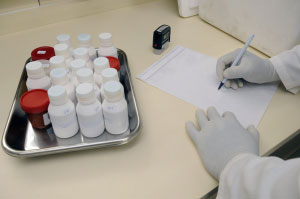Many people tend to have perennial respiratory infections, eczema, or allergies that cannot be diagnosed with routine tests, such as lymphocyte subsets, immunoglobulin series, and white blood cells. Testing the levels of the five types of immunoglobulins is also necessary.
However, while many people undergo these tests under their doctor’s recommendations, most don’t understand what their clinical significance is.
We’ve dedicated this piece to unraveling exactly that by taking an in-depth look at immunoglobulins, one of the most critical components of the human body.
What are Immunoglobulins?
Immunoglobulins are glycoproteins that are produced by plasma cells in the blood. They account for about 20 percent of the total protein present in plasma. They refer to a class of globulin that displays antibody activity or one with chemical structures similar to antibodies. They are the main reaction substances of the immune system’s humoral response.
As one of the body’s primary disease resistance components, they fight off bacteria, viruses, strengthen the phagocytosis of cell functions, and kill pathogenic microorganisms.
These are the five isotypes of immunoglobulins present in humans:
- Immunoglobulin G (IgG)
- Immunoglobulin A (IgA)
- Immunoglobulin M (IgM)
- Immunoglobulin D (IgD)
- Immunoglobulin E (IgE)
IgG makes up 80 percent of normal human serum, IgA makes up 15 percent, IgM makes up 5 percent, IgD makes up 0.2 percent, and IgE exists in trace amounts.

Clinical Significance of Immunoglobulin Tests
The main immunoglobulin tests include IgG (immunoglobulin G) IgA (immunoglobulin A), and IgM (Immunoglobulin M).
IgG
IgG is synthesized from plasma cells and is the only type of antibody that can pass through the placenta barrier. It can be synthesized three months after birth.
Increased levels of IgG may indicate or lead to asymptomatic monoclonal IgG disease, IgG myeloma, connective tissue disease, subacute or chronic infection, or chronic liver diseases.
Decreased levels of IgG may indicate or lead to nephrotic syndrome, protein loss enteropathy, ankylosing muscular dystrophy, selective IgG deficiency, mixed immunodeficiency syndrome, or hereditary or acquired antibody deficiency.
IgA
IgA, produced in both monomeric and dimeric forms, is primarily distributed in mucosal surfaces, nasal, bronchial, and digestive tract secretions, sweat, tears, colostrum, and saliva and in involved in the local anti-inflammatory immune response. The dimeric form of IgA is the most prevalent and is also known as secretory IgA.
Increased levels of IgA may indicate or lead to IgA myeloma, IgA nephropathy, breast cancer, familial neutropenia, cystic fibrosis, autoimmune diseases (including rheumatoid arthritis and SLE), subacute or chronic infectious diseases (fungal infections, tuberculosis, etc.), or chronic liver disease.
Decreased levels of IgA may indicate or lead to burns, protein loss, bowel disease, gamma-globulinemia deficiency, selective IgA deficiency, immunodeficiency disease, or hereditary or acquired antibody deficiency.
IgM
IgM, also known as macroglobulin, serves two roles: first, in monomer form as the B cell receptor binding to antigens during the immune system’s primary response; and second, secreted as a pentamer into the bloodstream where the antibody binds to antigens. Due to the large size of the pentamer, the antibody was originally referred as γ-macroglobulin, and then in subsequent terminology as IgM—"M" for “macro.”
Increased levels of IgM may indicate or lead to macroglobulinemia, connective tissue disease, liver disease, mycoplasma pneumonia, infectious mononucleosis, malaria, subacute or chronic infection, neonatal TORCH group, or fetal intrauterine infection.
Decreased levels of IgM may indicate or lead to mixed cryoglobulinemia, burns, protein loss enteropathy, selective IgM deficiency, mixed immunodeficiency syndrome, or hereditary or acquired antibody deficiency.
For premium-grade biological products intended for research on antibody testing, consider Pel-Freez Biologicals.
We are an industry-leading biological products manufacturer in the United States. Our company’s wide-ranging selection of high-quality products has allowed us to become a premier supplier of biological products to research facilities worldwide.
Our robust portfolio of superior quality biological products includes human serum (pooled and antibody depleted pooled), human plasma, animal serum, complement, and ancillary products. Other products include gamma globulins found in plasma, antibody depleted complement, human gamma globulin, adult rabbit complement, goat gamma globulin, and more.
Contact us to learn more or visit our website to purchase our products. Call at (800) 643-3426 or (479) 636-4361.

